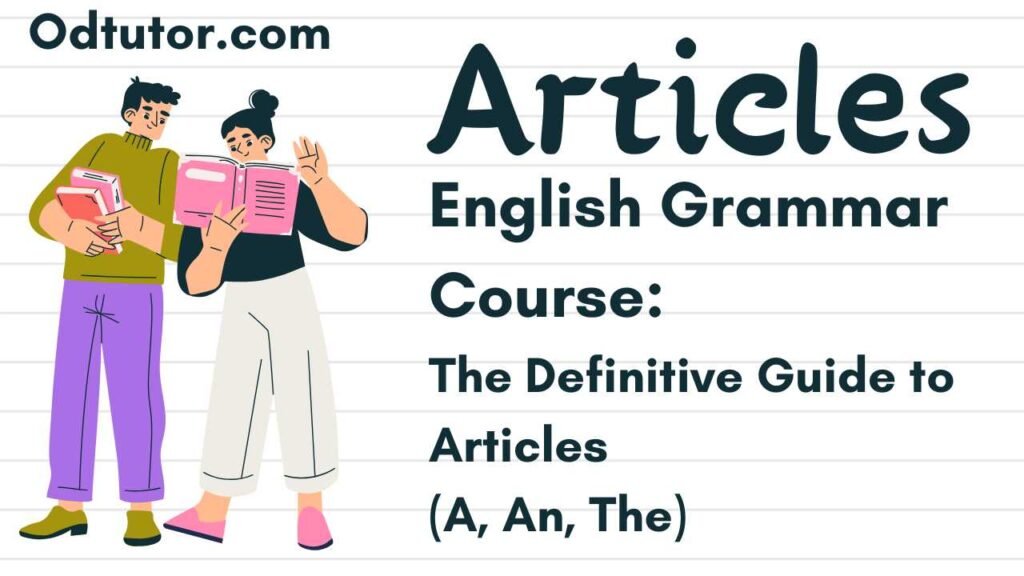What are Articles?
Articles are words used before nouns to define them as specific or general. In English, there are three articles: a, an, and the. A and an are called indefinite articles and refer to non-specific items (e.g., a car, an apple). The is a definite article and refers to something specific or already known (e.g., the sun, the book you lent me). The choice between a and an depends on the sound that follows: use a before consonant sounds and an before vowel sounds. Articles help make sentences clearer and more precise in both spoken and written English.
1. The Indefinite Articles: A & An
Function: We use “a” and “an” before singular, countable nouns when the noun is not specific or is being mentioned for the first time. They refer to any one member of a group.
The Rule:
- Use “a” before words that begin with a consonant sound.
- Use “an” before words that begin with a vowel sound (a, e, i, o, u).
Important: The rule is based on sound, not spelling.
Examples of “A”
- Before consonant sounds:
- I saw a cat in the garden.
- She is a doctor.
- He has a university. (Here, “university” starts with the consonant sound /j/, like “you”.)
- That is a one-time offer. (Here, “one” starts with the consonant sound /w/.)
Examples of “An”
- Before vowel sounds:
- Can I have an apple?
- He is an honest man. (Here, “honest” starts with a silent ‘h’, so the first sound is the vowel /o/.)
- It will take an hour. (Here, “hour” starts with a silent ‘h’.)
- She works for an FBI agent. (Here, “F” is pronounced “ef”, which starts with a vowel sound.)
2. The Definite Article: The
Function: We use “the” before nouns when the noun is specific.
- The listener/reader knows exactly what you are referring to.
- The noun is unique or there is only one.
- The noun has been mentioned before.
When to Use “The” (with Examples)
- Before specific nouns known to the audience:
- “I saw a cat. The cat was black.” (The second mention is specific.)
- “Could you please close the door?” (The specific door in this room.)
- Before unique things or things that are one of a kind:
- The sun, the moon, the sky, the Earth.
- The President of the United States.
- Before superlative adjectives:
- He is the tallest boy in the class.
- This is the best coffee I’ve ever had.
- Before ordinal numbers (first, second, etc.):
- This is the first time I’ve been here.
- She lives on the second floor.
- Before names of geographical areas, oceans, seas, rivers, and mountain ranges:
- The Middle East, the Alps, the Nile, the Pacific Ocean, the Sahara.
- With plural country names or countries that sound like plurals:
- The United States, the Netherlands, the Philippines.
- Before musical instruments:
- She plays the piano beautifully.
- Before adjectives to refer to a group of people:
- The rich, the poor, the elderly.
3. When NOT to Use an Article: The Zero Article
This is a crucial part of the lesson. We use no article in the following situations:
- With plural and uncountable nouns when talking about things in general:
- Cats are curious animals. (Not “The cats are…”)
- I love music. (Not “I love the music.” unless you mean specific music.)
- Information is power.
- With most proper nouns (names of people, cities, streets, most countries):
- Sarah lives in Paris. (Not “The Sarah”)
- I visited Japan last year. (Exceptions: the USA, the UK.)
- She works on Main Street.
- With meals, when talking about them in general:
- We had breakfast at 8 AM.
- Lunch is my favorite meal. (But: “The breakfast we had was delicious.” – specific breakfast.)
- With languages and academic subjects:
- She speaks Chinese.
- He is good at mathematics.
Summary Table for Quick Reference
| Article | Used For | Example |
|---|---|---|
| A | Singular, countable nouns starting with a consonant sound | I need a new phone. |
| An | Singular, countable nouns starting with a vowel sound | That is an old building. |
| The | Specific or unique nouns (both singular and plural) | Look at the moon! The books are on the table. |
| No Article | General ideas, plurals, uncountables, most proper nouns | Life is beautiful. She loves chocolate. |
Common Mistakes & Tricky Cases
- Jobs: Always use “a/an” when stating someone’s job.
- Correct: She is an architect.
- Incorrect: She is architect.
- Go to school vs. Go to the school:
- “I go to school.” (As a student, for the general purpose of learning.)
- “I went to the school to meet the principal.” (Referring to the physical building.)
- In hospital vs. In the hospital (US vs. UK usage can vary, but generally):
- “He is in hospital.” (He is a patient.)
- “She works in the hospital.” (She is an employee in the building.)
- Most vs. The most:
- “Most people enjoy music.” (Most = the majority of)
- “This is the most expensive car.” (Superlative adjective)
By mastering these rules and practicing with examples, you will significantly improve the natural flow and accuracy of your English.

